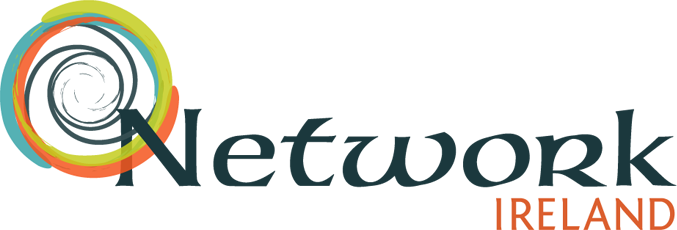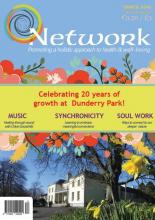Walking Your Own Path - Stories of alternative lives
by:
Network
Published:
Tuesday, February 4, 2014
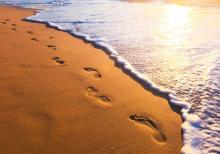
All life is change, but there’s no doubt the past decade has been particularly tumultuous. We’re all aware by now that many of the staple pillars of our society have been toppled or at least irreparably tarnished. People now have a very different relationship with the church, the government, and the financial sector than they did twenty years ago. The suffering that is being lived out as a consequence of the variety of crises Ireland has experienced is immeasurable in its depth and unfathomable in its reach, but it has also led to a mass dissatisfaction, and an increase in people stepping away from the well-trod paths to explore areas of life that they may not have considered otherwise.
Ken Gunning is originally from South Africa, and now lives with his wife in Standhill, Co. Sligo, where he has developed a ‘healthy addiction’ to surfing. ‘I was around 30 when I had my first surf lesson. That was around 12 years ago. I was living in Dublin along with my girlfriend, now my wife, and we came to Standhill for a weekend. I was drawn very strongly to surfing. I knew it was something I just wanted to get better at. We both had jobs in IT and we had bought a house in Dublin. We had a plan to travel around Europe in a camper van for a few months. I was able to try out surfing in lots of different countries. The trip was a kind of turning point, and on it we had the idea to relocate, so when we got back to Ireland we left our families and friends behind in Dublin and moved west’.
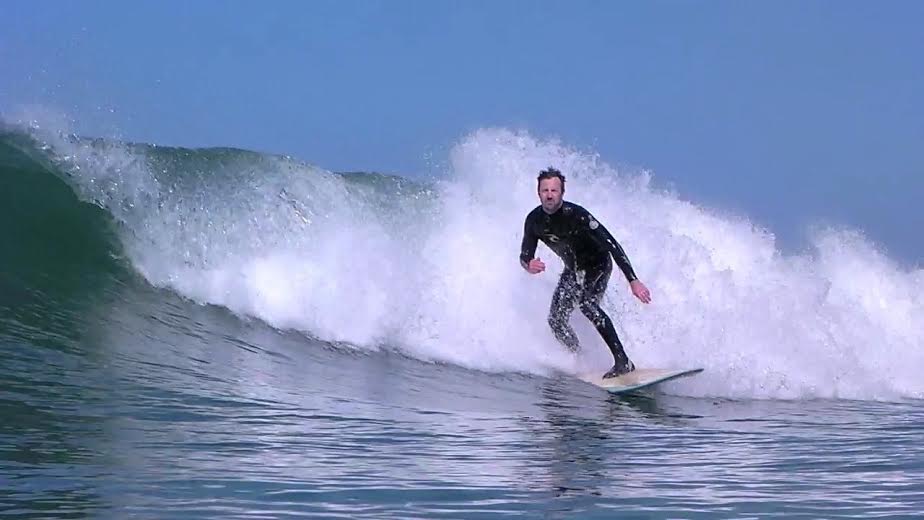

‘Life outside the city posed its own challenges. My girlfriend managed to get some office work locally, but jobs in IT were really scarce at the time so we had to do something different. I had a friend who’d also settled in the area and he knew about a bar that was closed. I’d never pulled a pint or worked in hospitality before, but I had a vision of bringing like-minded people to Strandhill and showing them the place and making a living from it. It wasn’t really about making money, it was just about doing something different. So we opened up the bar and set up a B&B. We were able to draw on our IT skills to build a website and market the place internationally. Surfing was just taking off in Ireland at the time so we were some of the first people in the area attracting people in for that reason. Myself and my wife lived above the bar at first, then we rented a little place, then we eventually bought a house here. We’ve since moved on from running the bar but we’re still very much in love with the place’.
For Ken moving away from the city opened up another side of life. ‘It was like there was something missing that we didn’t recognise until we moved. I think when you live rurally it is more important to be involved in your community; it is something that we didn’t really grasp before. To move somewhere without family and friends is a big step, but if you believe that you have to do it, then you do it. Life is so short and death is so long, so that provides the motivation’.
While living outside the city can certainly offer access to smaller, more involved communities, it can also be isolating. But for some people the isolation can be part of the attraction. Daire Lynch is an artist who moved from Dublin to Cong, Co. Mayo where he lives in a cottage on the banks of Lough Corrib.
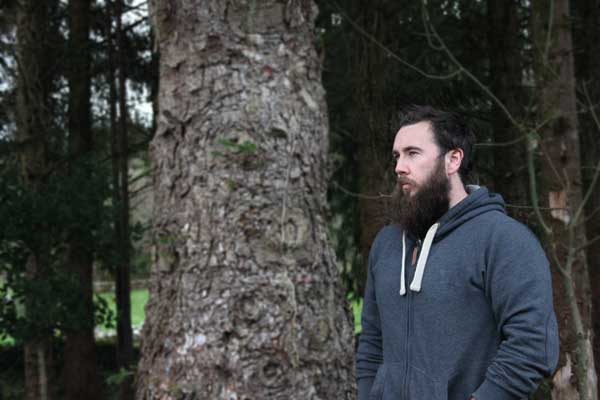

‘I’ve always drawn and always painted, ever since I was very young. But around 2006 or 2007 I started to get more serious about it. I realised that I couldn’t continue to do it as a past time. After school I’d studied advanced drawing for a while, which is a precursor to studying animation. Then I moved away from that and began working in a few different jobs. I worked in sound technology, then I moved between work in an off-licence and in a national insurance firm – heading in on the DART each morning in a suit and tie - and then I had a while where I was working in event management. I was made redundant, but in hindsight that was a godsend because it pushed me, and I went painting full time then’.
‘I moved to the countryside because it gave me the space to work the way I want. The isolation works for me. It is my schedule and my time. I am still connected to people through the internet, but there are not as many distractions, you won’t get people knocking on the door. It gives me the space to work the way I work best’.
‘The pattern tends to be getting up at around 11, and I’ll have coffee, do my emails, and all the other admin. Then I’ll get out for some kayaking, cycling, or just spending time outdoors. In the afternoon I’ll work on watercolour commissions until dark - I only do them in daylight. Then I break for dinner, and in the dark I work on oil paintings until 3 or 4 in the morning. I do try to get to bed by the very latest at 7 though sometimes it is tempting to stay working. But I know it has a knock on effect and I won’t get tomorrows work done. I can’t take days off. The days I sit around I think – I’m going to die one day and not going to get these back. It’s a compulsion, almost an addiction at this stage. If I have to go away, I take the painting with me’.
It seems to be a marriage of inner passion and outer circumstance that caused both Ken and Daire to reassess and redirect their lives.
They both moved away from corporate environments to embrace a slower pace of life. ‘There’s nothing I miss about my previous existence’ says Daire. ‘It was so regimented. I like to be my own boss. I like to drive myself. I’ll move again but I’m never going to go out of the woods. I don’t like the city, I’ve nothing against it but it is not for me. I always wanted to live around Dingle, in some remote house, down by the ocean. So that’s my long term plan’.
Similarly Ken has found the slower pace of life more attractive as time has passed. ‘I think we will definitely stay in the countryside. We came for surfing, but the place has been inspiring in so many ways. I’ve started painting and drawing and taking photographs so it has led on to lots of other things. I’m planning to return to education next year to study Fine Art. I enjoy being in the city but there’s not much that we would miss. It’s still easy and exciting to get back to Dublin occasionally. But there is so much to keep up with in the city and that’s not as prevalent here. Long term I think we would love to move out of the village and further into the countryside, and live a lot more self-sufficiently. We got a free poly-tunnel the other week so that is the first step’. While some people are moving out of Dublin, others are continuing to move to it and reshape the landscape. The city centre is seeing its own change with many people taking advantage of vacant prime locations to start new businesses.
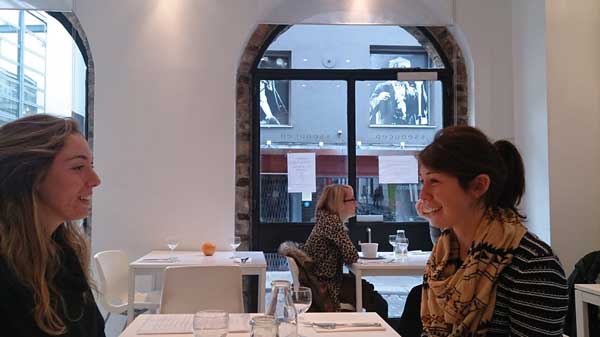

Sil Packter, originally from Brazil, recently opened Ireland’s first organic raw food restaurant, Sseduced, in Temple Bar. Her journey to raw food started early on in life. ‘I started to become a vegetarian around 12. In those days there was no internet, and in Brazil I didn’t know any vegetarians or vegans. I was introduced to raw food around 16 when I went to California, my uncle lived there and we went to a raw food restaurant. That changed my life. The food was so delicious and I didn’t know it was possible to make something so tasty with just raw ingredients’.
The path to opening Sseduced came about gradually, she says ‘I was studying medicine and cooking was always a hobby for me. I always cooked for friends and had dinner parties. People then began to ask for recipes and then asking me to teach them. Then so many people began asking that I started to put them into groups to teach on different days, and then eventually I started to charge to cover the costs. It was a natural thing. Then because I was cooking raw and it was new for so many people I was asked to do some talks. That’s when I started to reconsider my path of study – I realised that this was medicine in action, and I started to focus on the idea of opening a restaurant’.
‘Everybody warned me that the restaurant business was really hard. That you wouldn’t sleep. So I knew it would be hard, but the truth is that it is even harder than I could imagine. Cooking is just a fraction of the work. There’s sales and marketing, and there is the pressure of meeting costs of rent. It is getting easier as it goes along, but sometimes it can be overwhelming. But I have a passion for the work and that’s what keeps me going. Raw food is a new idea for so many people, so I want to show them what amazing things you can do. I like the idea that people can come along to try something new, I don’t think that what you eat should become a rigid, religious ideal. So while we are attracting a lot of people who are vegan, or who have restricted diets, we are also bringing in people who are meat-eating food lovers who are prepared to try something delicious and healthy. They are my favourite type of customers. It is slow progress but I’m confident that word will get out and things will take off here’.
Financial stability is a concern for most people, and it is a key consideration for anybody looking to make changes, however small, to their lifestyle. While many of us imagine that having a little more (or a lot more) money could solve the problems in our lives, Mark Boyle took an entirely contrary approach.
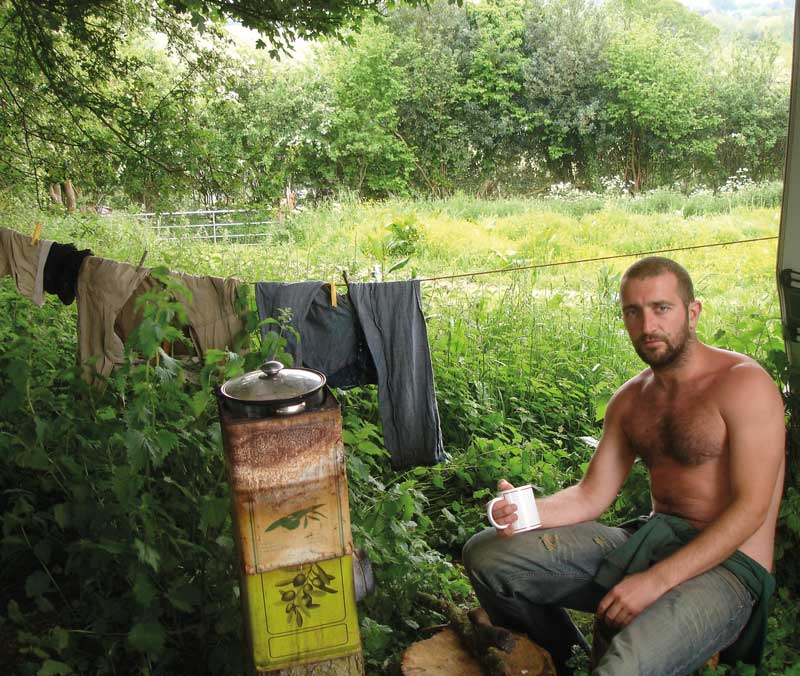

‘I’ve a background in business. I studied business and economics and like most people, I spent much of my adult life concerned with getting a good job. But along the way I was aware that we things were far from ideal and I was questioning things. I spent many years reflecting and enquiring as to how we had gotten into such personal, societal, and ecological mess. I felt that at the root of this lay in a disconnection from the source of our products – essentially between us and our actions’.
‘As a simple example, think of a shirt or item of clothing. When I buy it, I’m disconnected from the people that manufactured the shirt. I’m disconnected from the cotton or other materials that were used to create the fabric, and from the people that grew and harvested that. I’m disconnected from the reality of how the finished product was transported across the globe, and then transported locally to the shop. These are just some of the incidents in a massive chain that I’m not connected to and often not aware of. In a way being separated from the reality of the process that creates products in our lives is being separated from nature. Because we are disconnected from nature we value it less. And the biggest tool of disconnection that we have is money’.
As an experiment Mark decided to live for a year without money, ‘I was inspired by the Gandhi quote to “be the change to wish to see in the world”’. Armed with a caravan and wood-burning stove he found for free online, he began looking at alternatives ways to provide for himself.
‘There are a number of ways to get food. Between foraging for wild food, and growing your own food I was able to keep myself well fed. You can also make use of waste food, and barter for food. Sustaining myself in this way forced me to be much more connected to the source of my food and the products I needed – it brought me much closer to the local community. I found people on the whole to be very open and willing. I did have media coverage at the time, and it is hard to judge how much that impacted on how people reacted to me – but overall the feedback was vastly positive’.
‘The only negativity I encountered was online. And I think that goes to confirm the idea that the further removed you are from something, the less you value it. The more we have anonymity the more we are prone to negativity. Living without money meant I was forced to engage with people on a very real level, and I found that on that level, most people are not negative. You can have a much more open and honest relationship with people without money. In a way, money signifies the end of a relationship. It brings with it an expectation of satisfaction. If you go to a restaurant and pay money for a meal, you’re far more likely to be critical of it, but if you came to my house and I cook you a meal without money being involved, you’re much more likely to be grateful for the meal’.
Mark continued on without money for a second year after the experiment, and has since returned to using money, but equipped with a lot of lessons from his experience. ‘What I’ve realised is that there a lot of needs in the world, like the need for security, and friendship, and contentment – money is a way to meet some of these needs, but it is not the only way, and often it is not the best way. Money is a relatively new tool in our human history, we have gotten by for a very long time without it’. Mark suggests that while we are unable to all suddenly disconnect from the use of money, relying on it less can be very beneficial. ‘I think working towards a society that isn’t monopolised by money offers a lot of potential. It will force us to connect more within our local communities. It can help foster a greater appreciation of other people in the world that are involved in our products, and their rights and conditions. And most importantly it can help us connect back to nature, to the world that we are part of. Our obsession with money can cause us to constantly look at things and ask ‘how much can I get?’ but by shifting perspective we can ask ‘how much can I give?’ and that can allow us to explore alternate, more sustainable and connected ways of meeting our needs’.
From the tumult these inspiring individual stories of change are emerging. The common thread running through them all is a dissatisfaction with the current situation coupled with a passion for something beyond it. Whether that passion is for surfing, painting, raw food, or a desire for change, the act of identifying our own path and beginning to move along it seems to bring about a greater degree of contentment, both for the individual, and for the greater community they are part of - it seems the greatest journeys still begin with a single step.
Further Reading:
- If you're interested in finding out more about Ken, Daire, Mark, and Síl and the work they do you can check out the links below
Related Links:
Tags:
In Issue:
Latest Issue
Upcoming Events
-
17/04/2020 to 26/04/2020
-
18/04/2020
-
23/04/2020
-
15/05/2020 to 23/05/2020
-
16/05/2020 to 17/05/2020
Recent Articles
Article Archive
- July 2018 (2)
- August 2018 (1)
- September 2018 (1)
- November 2018 (1)
- December 2018 (1)
- February 2019 (1)
- April 2019 (2)
- May 2019 (2)
- June 2019 (1)
- July 2019 (2)
